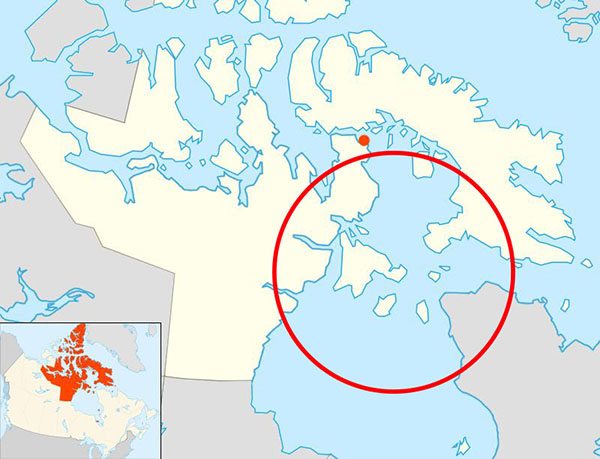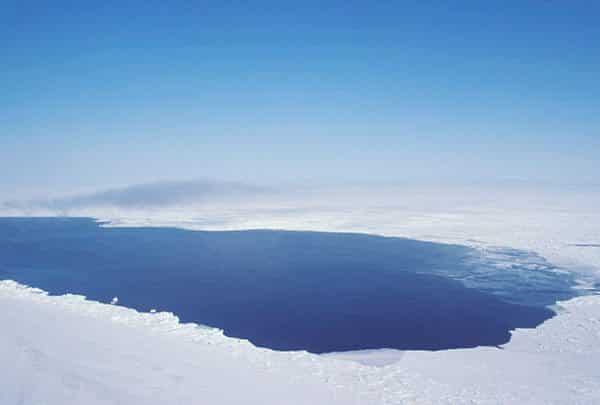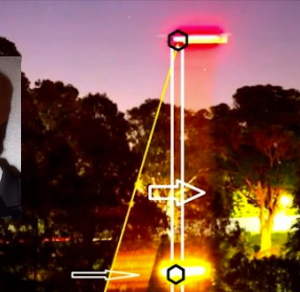The Canadian military investigated a mysterious pinging signal coming from the depths of the Arctic Ocean. They have no clue about what’s causing the cryptic sound.
Afraid it might scare off fish and game, concerned fishermen and hunters from the remote Nunavut region in Canada reported this strange noise in the Arctic to authorities. They say the weird pinging has been going on for months and corresponds with a massive drop in marine wildlife occurrence in the area. The locals are rightly afraid this phenomenon will impact their livelihood but the UFO community suspects the repercussions might go much deeper than that.
Described as a hum, the sound appears to originate from the seafloor in the Fury and Hecla Strait, a thin canal in the Qikiqtaaluk region.

The red circle represents the area where the sound was heard. The orange dot is the closest human settlement.
Locals call this type of habitat a polynya and it the variety of species that populate it provide an important and all-year-round source of food. But, as Nunavut legislator Paul Qassa told the CBC, that richness has critically dropped in recent times:
That’s one of the major hunting areas in the summer and winter because it’s a polynya. And this time around, this summer, there were hardly any animals. And this became a suspicious thing.”
On pins and needles, Qassa took up the issue with the local authorities and that’s when reports started coming in. During a local radio show, locals called in to report they had also heard and felt the strange sound. Some could even feel it through the hull of their boats. With the severity of the situation increasing, another official was sent to investigate and came up with a similar conclusion: there were almost no animals in the polynya.

A polynya is a stretch of open water surrounded by ice.
In an attempt to explain the anomaly, several theories were put forward. One of them was that the sound was caused by the Baffinland Iron Mines Corporation doing sonar surveys in search of iron ore deposits. But the company denied having any equipment in the area and no work permits were issued for that particular portion of water.
Another theory says the culprit is the environmental organization Greenpeace, who have been purposely generating the strange noise in the Arctic Ocean in order to scare off animals and drive them out of the way of hunters and fishermen. Yet no evidence of their involvement could be found and the agency have been adamant about their non-involvement.
“Not only would we not do anything to harm marine life, but we very much respect the right of Inuit to hunt and would definitely not want to impact that in any way,” one of their spokesperson told CBC.
With no explanation in sight, the situation called for the implication of the heavy cavalry. This month, the Canadian Department of National Defence (DND) sent a squadron of military aircraft to survey the zone.
“The Canadian armed forces are aware of allegations of unusual sounds emanating from the seabed in the Fury and Hecla Strait in Nunavut,” stated DND representative Ashley Lemire. “The air crew performed various multi-sensor searches in the area, including an acoustic search for 1.5 hours, without detecting any acoustic anomalies. The crew did not detect any surface or subsurface contacts. […] at this time, the DND does not intend to do any further investigations,” she concluded.

“Let’s head back, boys, nothing to see here.”
It’s a bit disconcerting to hear that, even when using their top-shelf technology, the military failed to isolate the source of the mysterious pinging sound. Even more worrying is the fact that the sound stopped when they were surveying the area, as if whoever or whatever made it knew they were looking.
As far as the available information can tell us, mankind has no underwater bases. Heck, we don’t even have the technology to build a permanent underwater base and even if we did, the cost would be highly prohibitive. Extreme pressure makes the ocean floor an unforgiving place and that is why we know less about the bottom of Earth’s oceans than we do about Mars.

We can’t stay down there for long but most UFOlogists agree advanced extraterrestrials could establish and maintain an operational base on the seafloor. If their aim is to remain unseen and keep a close eye on us, the ocean would be their best bet. Reports from all over the world have made it obvious that unidentified flying objects can also go underwater without much trouble. As a matter of fact, if an extraterrestrial craft can withstand deep space, the most unforgiving of environments, it would probably be over-prepared for a dive. If they can go inside active volcanoes and move through liquid rock, the most abundant, room temperature liquid on our planet (water) should pose no threat.
If an underwater alien base is indeed responsible for the strange pinging sound in the Arctic Ocean, we can only wonder why they are doing that. They could be studying marine wildlife, but I doubt that would be of very much use to them. They could be extracting rare resources that can only be found down there. They could be performing experiments on Earth’s fauna, humans included. Or maybe they’re an aquatic species and that’s the place that makes them feel most at home.
It’s all speculation, so feel free to add your own.










Those are ice balls formed in sink holes as seen in the Russian holes. The surface of Earth is collapsing and this is the proof. Surface of Earth is unstable. https://www.youtube.com/watch?v=r5uKfm4U1lI